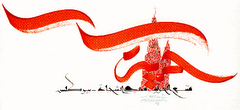[21 November 2010] – On Sunday, two Givati Brigade staff sergeants were demoted in rank to sergeants by an Israeli military court and given three-month suspended sentences for ‘inappropriate conduct’ after being convicted of forcing a nine-year-old boy at gunpoint to search for explosives during the war in Gaza (Haaretz - 21 November 2010).
Nine-year-old Majed's ordeal began on 15 January 2009, when his family sought shelter in the basement of their apartment building in Gaza City during an intense Israeli bombardment. Majed recalls that there were about 40 men, women and children in the basement seeking shelter. At around 5:00am, units from the Givati Brigade entered the basement 'firing.' Majed recalls seeing the red laser sights from their guns everywhere. The soldiers separated the men from the women and children and forced them to strip down to their underwear. Whilst this was going on a soldier approached the group of women and children and pointed to Majed and said 'come here.' The following account is taken from Majed’s sworn affidavit:
‘The soldier approached me and grabbed my shirt from my neck and draged me away. “He’s a child,” my mother began shouting. I thought they would kill me,’ recalls Majed, ‘I became very scared and wet my pants. I could not shout or say anything because I was too afraid. The soldier dragged me 20 metres away. He pointed his weapon at me. He was shouting at me and I did not understand him, so he grabbed me and pushed me against the wall. He then started motioning with his hand and I figured out he wanted me to open the bags; small bags that the residents brought down with them containing their personal effects and money. The bags were similar to the bags used by football players. I understood from his hand gestures that he wanted me to open the bags. There were two bags in front of me. I grabbed the first one as he stood one-and-a-half metres away. I opened the bag as he pointed his weapon directly at me. I emptied the bag on the floor. It contained money and papers. I looked at him and he was laughing. I grabbed the second bag to open it but I could not. I tried many times but it was useless, so he shouted at me. He grabbed my hair and slapped me very hard across the face. I did not shout or cry but I was very scared. He dragged me away from the bags and forced me to stand against the wall, as he stood about one-and-a-half metres behind me. He then shot at the bag that I could not open. I thought he shot at me, so I shouted and put my hands on my head. He then pulled me through the corridor and another soldier said “Go to your mother.” I ran to my mother and hid in her arms. “I wet my pants,” I said to her. “It’s fine,” she said.’
Majed and the other residents of the apartment building were held in the basement by the soldiers at gunpoint until 3:00pm. Majed recalls that one of the soldiers guarding them sat on a chair nearby: ‘He would shout now and then “boom, boom” like an explosion. We would all put our hands on our heads, and the soldier would laugh loudly. He repeated this about five times. He then went and sat about five metres away from us. Four other soldiers sat next to him. The soldiers pointed their weapons at us, and I would get scared. I could see the red light moving over my body and my siblings and mother. There was a thin red light coming from their weapons. Whenever I saw them lifting their weapons or the red light, I thought they would shoot us.’ At 3:00pm the soldiers told the women and children to carry a white flag and head for the nearby Red Crescent building. The men were told to remain behind. On 28 April 2009, DCI-Israel submitted a complaint to the Israeli authorities in relation to the army’s use of 10 children as human shields, including Majed. On 17 June 2009, the Israeli authorities responded saying that the cases were being investigated, and on 25 November 2009, Majed and his mother were requested to attend an interview conducted by the Israeli Military Police at Erez Checkpoint, Gaza. According to a sworn affidavit provided to DCI by Majed's mother, Majed was prevented from using a toilet prior to his interview and wet himself. At the time of writing, the two soldiers who used Majed as a human shield are the only soldiers ever to have been charged with using civilians in this manner. In October 2005, the Israeli High Court ruled that the use of civilians as human shields is illegal under Israeli domestic law. Since the Court ruling, DCI has documented 15 cases of the Israeli army using children as human shields, including Majed’s case. Three of these cases occurred after Majed’s case in 2010, indicating that the Israeli army continues to use children as human shields, in clear defiance of the Israeli High Court. The sentence handed down today suggests that the Israeli army and military justice system still does not take seriously the obligation to protect civilians during times of armed conflict. | 


Aucun commentaire:
Enregistrer un commentaire